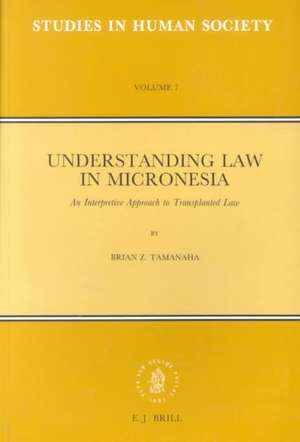Understanding Law in Micronesia: An Interpretive Approach to Transplanted Law: Studies in Human Society, cartea 7
Autor Brian Z. Tamanahaen Limba Engleză Paperback – 31 mar 1993
Application of this approach results in insights about law in Micronesia, as well as about law itself, and about the ideology of law. A wide range of subjects are addressed, from the nature of legal thinking to the autonomy of law. It is a work in legal theory grounded in psychological, sociological and anthropological observations and analysis.
Preț: 569.89 lei
Preț vechi: 694.98 lei
-18% Nou
Puncte Express: 855
Preț estimativ în valută:
109.08€ • 118.53$ • 91.69£
109.08€ • 118.53$ • 91.69£
Carte indisponibilă temporar
Doresc să fiu notificat când acest titlu va fi disponibil:
Se trimite...
Preluare comenzi: 021 569.72.76
Specificații
ISBN-13: 9789004097681
ISBN-10: 9004097686
Pagini: 214
Dimensiuni: 155 x 235 x 14 mm
Greutate: 0.4 kg
Editura: Brill
Colecția Brill
Seria Studies in Human Society
ISBN-10: 9004097686
Pagini: 214
Dimensiuni: 155 x 235 x 14 mm
Greutate: 0.4 kg
Editura: Brill
Colecția Brill
Seria Studies in Human Society
Public țintă
Lawyers and legal theorists, legal sociologists and anthropologists; all those interested in law in developing countries, in transplanted law, in the Pacific region, or in interpretive analysis.Notă biografică
Brian Z. Tamanaha, S.J.D. (1992), Harvard Law School, is Lecturer at the University of Amsterdam. He has published articles on a range of subjects, including legal anthropology and legal theory.
Recenzii
'This is an important and useful book, as much, and possibly more so, for its ability to enhance an appreciation for the nature of the law transplanted in Micronesia as for its explication of the changes wrought...'
Jonathan Aleck, Pacific Affairs, 1994.
'L'intérêt du travail réside dans la description narrative des personnes et des faits remarquable.'
Jeanne Marie Léonard, Etudes Théologiques et Religieuses, 1994.
Jonathan Aleck, Pacific Affairs, 1994.
'L'intérêt du travail réside dans la description narrative des personnes et des faits remarquable.'
Jeanne Marie Léonard, Etudes Théologiques et Religieuses, 1994.
Cuprins
Preface
CHAPTER ONE, Introduction
Existing Approaches to Transplanted Law
A.The Law and Development Movement
B.Legal culture
C.Legal Anthropology and Legal Pluralism
Understanding (Law in Micronesia)
(Understanding Law) in Micronesia
Thesis
CHAPTER TWO, The Setting
Law from Afar
Actors
A.Expatriate Lawyer
B.Micronesian Lawyer
C.Non-Lawyer Micronesian Legal Actors
D.Micronesian Non-Legal Actors
Legal discourse
A.Legal Language is English
B.Legal Language
C.Stylized Mode of Discourse
When a Judge Is a Judge
A Case of Translation
Law’s Resistance
People behind the Law
Leaving the Setting
CHAPTER THREE, Theory Talk
Mundane Phenomenology of Alfred Schutz
A.Intersubjectivity, Thought, and Social Interaction
B.Methodology: Intersubjective Meaning and Ideal Types
C.Softening Schutz’s Objectivism
Geertz’s Cultural Hermeneutics: Thick Description
Schutz and Geertz, and Their Shared Weakness
Self-serving Note on Methodology
CHAPTER FOUR, Law in Interpretive Terms
Legal Institution as a Complex of Connected Actions
Elements of Law
Internal Legal Attitude of the U.S. Legal tradition
A.Law as a Separate Reality
B.Judging: Cognitive Style and Patterns of Thought
A Claim to Plausibility
CHAPTER FIVE, Back to Micronesia
Communities of Mixed Thought and Mixed Communities of Thought
A.The Concept Culture
B.Two Senses of Mixed Culture
C.A Stranger in the Community
Inside the Legal Arena
A.Expatriate Lawyers in the Internal Legal Attitude
B.Micronesian Lawyers in the Internal Legal Attitude
C.Non-Lawyer Micronesian Legal Actor’s Experience of Law
D.Impact of Non-Lawyer Judges on Operation of Legal System
E.Countervailing Poles
Seeing Something Else When Looking at Law
A.The Ideology of Law
B.Law as a Symbol
C.Legal Institutions and Legal System
D.What They Do See
E.Law at a Distance
F.Advantage of Positive Knowledge about Law
G.Cross-Cultural Interaction within a Community
CHAPTER SIX, An Autonomous Law
The Autonomy of Law
Figuration Theory
National and State Level Figurations
Three Types of Autonomy
CHAPTER SEVEN, Conclusion
Bibliography
Index
CHAPTER ONE, Introduction
Existing Approaches to Transplanted Law
A.The Law and Development Movement
B.Legal culture
C.Legal Anthropology and Legal Pluralism
Understanding (Law in Micronesia)
(Understanding Law) in Micronesia
Thesis
CHAPTER TWO, The Setting
Law from Afar
Actors
A.Expatriate Lawyer
B.Micronesian Lawyer
C.Non-Lawyer Micronesian Legal Actors
D.Micronesian Non-Legal Actors
Legal discourse
A.Legal Language is English
B.Legal Language
C.Stylized Mode of Discourse
When a Judge Is a Judge
A Case of Translation
Law’s Resistance
People behind the Law
Leaving the Setting
CHAPTER THREE, Theory Talk
Mundane Phenomenology of Alfred Schutz
A.Intersubjectivity, Thought, and Social Interaction
B.Methodology: Intersubjective Meaning and Ideal Types
C.Softening Schutz’s Objectivism
Geertz’s Cultural Hermeneutics: Thick Description
Schutz and Geertz, and Their Shared Weakness
Self-serving Note on Methodology
CHAPTER FOUR, Law in Interpretive Terms
Legal Institution as a Complex of Connected Actions
Elements of Law
Internal Legal Attitude of the U.S. Legal tradition
A.Law as a Separate Reality
B.Judging: Cognitive Style and Patterns of Thought
A Claim to Plausibility
CHAPTER FIVE, Back to Micronesia
Communities of Mixed Thought and Mixed Communities of Thought
A.The Concept Culture
B.Two Senses of Mixed Culture
C.A Stranger in the Community
Inside the Legal Arena
A.Expatriate Lawyers in the Internal Legal Attitude
B.Micronesian Lawyers in the Internal Legal Attitude
C.Non-Lawyer Micronesian Legal Actor’s Experience of Law
D.Impact of Non-Lawyer Judges on Operation of Legal System
E.Countervailing Poles
Seeing Something Else When Looking at Law
A.The Ideology of Law
B.Law as a Symbol
C.Legal Institutions and Legal System
D.What They Do See
E.Law at a Distance
F.Advantage of Positive Knowledge about Law
G.Cross-Cultural Interaction within a Community
CHAPTER SIX, An Autonomous Law
The Autonomy of Law
Figuration Theory
National and State Level Figurations
Three Types of Autonomy
CHAPTER SEVEN, Conclusion
Bibliography
Index







